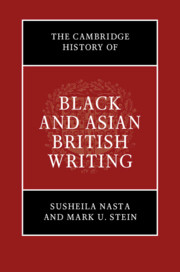Book contents
- The Cambridge History of Black and Asian British Writing
- The Cambridge History of Black and Asian British Writing
- Copyright page
- Dedication
- Contents
- Notes on Contributors
- Preface and Acknowledgements
- Introduction
- Part I New Formations
- Part II Uneven Histories
- Part III Writing the Contemporary
- (I) Looking Back, Looking Forward
- (II) Framing New Visions
- 32 Through a Different Lens
- 33 Children’s Literature and the Construction of Contemporary Multicultures
- 34 Redefining the Boundaries
- 35 Prizing Otherness
- 36 Frontline Fictions
- 37 Reimagining Africa
- 38 Post-Secular Perspectives
- 39 Post-Ethnicity and the Politics of Positionality
- Select Bibliography
- Index
38 - Post-Secular Perspectives
Writing and Fundamentalisms
from (II) - Framing New Visions
Published online by Cambridge University Press: 19 December 2019
- The Cambridge History of Black and Asian British Writing
- The Cambridge History of Black and Asian British Writing
- Copyright page
- Dedication
- Contents
- Notes on Contributors
- Preface and Acknowledgements
- Introduction
- Part I New Formations
- Part II Uneven Histories
- Part III Writing the Contemporary
- (I) Looking Back, Looking Forward
- (II) Framing New Visions
- 32 Through a Different Lens
- 33 Children’s Literature and the Construction of Contemporary Multicultures
- 34 Redefining the Boundaries
- 35 Prizing Otherness
- 36 Frontline Fictions
- 37 Reimagining Africa
- 38 Post-Secular Perspectives
- 39 Post-Ethnicity and the Politics of Positionality
- Select Bibliography
- Index
Summary
Especially since the publication of Salman Rushdie’s The Satanic Verses in 1988 and the protests that followed, Islam and Muslims in Britain have been at the centre of public and political debate. The protracted conflict between Rushdie exercising his right to free speech and Muslims demanding respect for their faith helped forge a reductive opposition between creative freedom and religious repression which continues to shape constructions of Muslims today. This chapter explores how works by writers including Rushdie, Hanif Kureishi, Nadeem Aslam, Monica Ali, Mohsin Hamid, Leila Aboulela, Kamila Shamsie, and Sunjeev Sahota engage with the aftermath of the Satanic Verses controversy or respond to the 9/11 and 7/7 attacks in New York and London. Moving through themes including cross-cultural translation, belonging, place and terror, and underlining the importance of thinking about religion and race always in combination with gender and class, the chapter asks how far and in what ways this body of writing offers us a post-secular perspective – one that recognises the place of religiosity within the public sphere, and advocates a mutually respectful dialogue between secularism and faith.
Keywords
- Type
- Chapter
- Information
- The Cambridge History of Black and Asian British Writing , pp. 634 - 649Publisher: Cambridge University PressPrint publication year: 2020

